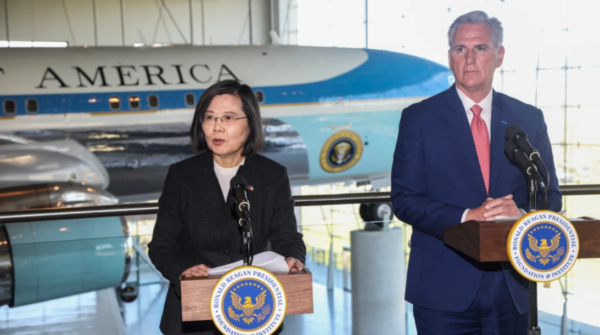China started naval maneuvers near Taiwan’s East coast after President Tsai Ing-wen’s meeting with House Speaker Kevin McCarthy (R-Calif.). China conducted naval operations simulating a blockade of the island state after then-Speaker Nancy Pelosi (D-Calif.) visited last year. Xi Jinping has promised the “reunification of the motherland,” and the only question is whether this will be done militarily or peacefully.
China would finally dominate sophisticated chips if it could purchase and run Taiwan’s burgeoning technological industry, including TSMC’s chip production facilities.
Xi doesn’t comprehend free-market ecosystems if he believes he can control the supply chain by seizing the plants that create 90% of the world’s high-end chips. TSMC’s real estate isn’t like a gold mine. TSMC’s factories are only valuable in a global economy of competitive, trusted, collaborating enterprises.

China could only destroy the world’s largest chip manufacturer.
TSMC leads an industry that is the epitome of trust-based globalization, where factories can only work with partners from Europe, Asia, India, and the Americas. TSMC manages a complex network of vendors, partners, workers, customers, and rivals to dominate the semiconductor business. These contributors work together to provide precise fabrication inputs.

If the Chinese Community Party took over the facilities and gave Xi’s bureaucrats power, confidence would vanish and this delicate ecology would collapse.
ASML, a Dutch company, makes photolithography devices that can etch a chip thinner than a DNA strand for TSMC. These $200 million machines are some of the most complicated ever made, requiring continual maintenance and becoming obsolete in a few years unless the suppliers upgrade them.
ASML’s photolithography equipment work on wafers supplied by partners like Germany’s Siltronic, which offers “blanks” manufactured through extremely complicated materials processing and works with TSMC to understand present and future process needs. Intel, Qualcomm, and Apple are examples of firms that outsource chip fabrication to factories.
Many of these firms fight hard, but they trust TSMC to protect their IP and respect contracts. TSMC promises not to reverse engineer, distribute, or steal trade secrets from ecosystem participants. They also presume that the partners follow the law and are not Trojan Horses for their own country’s intelligence agencies. Even among rivals, this is commerce in free democracies.
This basic trust would clog the world’s most sensitive manufacturing process if violated.
Taiwan would lose its global technology partner and vendor status if China took the island bloodlessly. Instead of China owning the chip business, fabrication would stop as corporations worldwide considered entrusting their most precious IP to a government that has a history of employing its corporate champions to steal private knowledge from unknowing partners.
Chip supply would be unavoidable for the globe, including China. China taking Taiwan will devastate the global economy.
Former U.S. National Security Advisor Robert O’Brien said the U.S. would “scuttle” the industries if China took them. It’s pointless.
The world must safeguard Taiwan’s chip-making facilities, but they cannot be overrun. It was unsalvageable.

